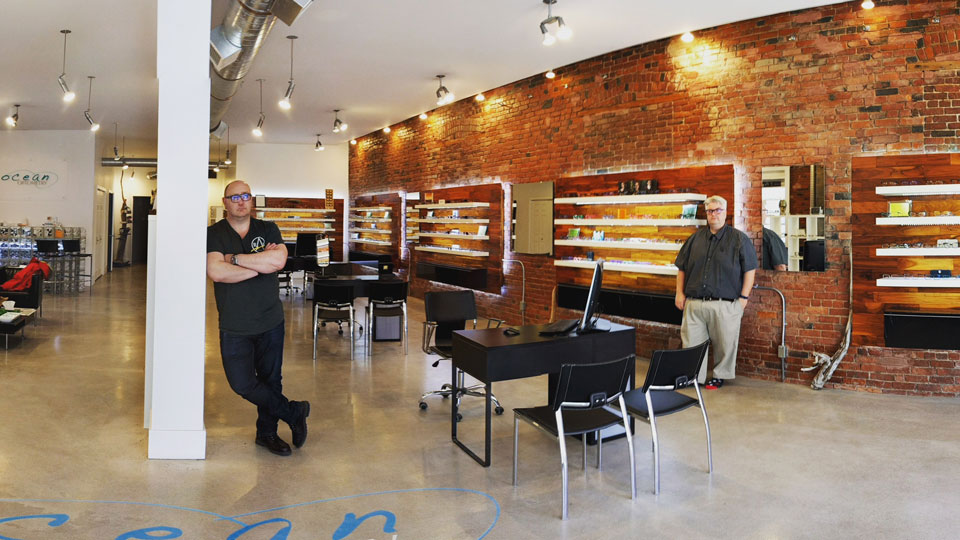- OT
- Life in practice
- Practitioner stories
- Coronavirus: on the ground in Nova Scotia
On the ground
Coronavirus: on the ground in Nova Scotia
Optometrists Dr Euan McGinty and Dr John Wilson on sleepless nights, the importance of networks, and preparing for a return to practice

17 June 2020
As the coronavirus (COVID-19) pandemic transforms the way optometrists practise, OT is sharing the experiences of optometrists across the UK and beyond. If you, or a colleague, is interested in sharing your story please get in touch by email.
In a nutshell
Location: Nova Scotia, Canada
Years qualified: 27 (Dr McGinty), 15 (Dr Wilson)
Mode of practice: optometrists.
It was like watching a slow-motion train crash as COVID-19 spread around the globe. Initially, there was denial, ‘It can't happen here’ and then watching, with horror, as it spread and spread and spread. It really all changed over the weekend of 14 March. That weekend the first confirmed case was announced in Nova Scotia. From the Monday onwards, things changed very rapidly.
Ontario was rapidly shutting down and the atmosphere locally changed. Some practices started cancelling appointments and adopting physical distancing measures. It became obvious that we couldn't adequately ensure the safety of our employees or the public. Therefore, on 18 March, we decided to cease normal operating hours at the end of that day.
Each province of Canada is self-governed by its chief medical officer. In Nova Scotia, there was an instruction that we had to stop all but urgent care. This pandemic completely changed the way we were practising. We started offering emergency care, which involved initial phone triaging.

It has been an exceptionally stressful experience, largely due to the uncertainty. Thankfully, my wife can do a lot of her work from home. We have two children at university. Our eldest is due to graduate and the ceremony has been cancelled, which is such a shame. Our middle child's year effectively fizzled out with him coming home a month early. Our youngest is halfway through high school and his school had an extended spring holiday as the schools closed. They have quickly integrated online solutions and he now attends his routine timetable, but from home. It's all a bit like an out-of-body experience.
During lockdown, we supported our patients by continuing to offer emergency services. We were regularly in communication with our staff, although they had all been laid off. We had a weekly Zoom happy hour. We also decided to create a regular Zoom meet-up for independent optometrists and had a couple of those, which were well-received. Independent practice can feel somewhat isolated at times, but it is quite simple now to be involved in various networks.
I think in the short-term, practice will involve PPE and considerations of patient load to allow for physical distancing. Mid-to-long term, I am hopeful that life will get back to normal. People have short memories and we may just fall back into our old habits. It's useful to remember that after the Spanish flu, the next decade was the roaring twenties.
My main concern now is having the funds to see us through the pandemic. Sleeping is quite difficult
Dr John Wilson: I qualified in 2005 in the UK and in 2009 I qualified to practise in Canada. I initially emigrated to Grand Falls-Windsor, Newfoundland, in 2010, and then to Halifax, Nova Scotia, in 2011.
During the early stages of the outbreak, I thought ‘What is the panic? This is going to be another seasonal flu virus that we have to deal with.’ But it became apparent talking to family in Italy that this was having a massive impact, and quickly. At the beginning of March, I noticed many more patients were cancelling their appointments or just not showing up. Our staff started to become more concerned and following consultation with staff we took the step to close the office before an actual lockdown in Nova Scotia. It was the right thing to do.
At the start, we had very little PPE, which thankfully has now changed. Euan has 3D printed face shields. The cleaning and sanitising has obviously increased dramatically. We thought we were thorough before, but things can always be improved if needs must. Patients are directed as to which seats to use to maintain personal distancing. Time between patients has been increased but to be honest, the workload has decreased so dramatically, this has probably happened as a consequence.
Initially, my stress levels increased dramatically until we made the decision to close the office. That seemed to make things easier for a time. My main concern now is having the funds to see us through the pandemic. Sleeping is quite difficult. I think I've gained half a stone. The uncertainty holds the biggest fear factor.
As we return to more routine practice, initially patient load will need to be tailored to maintain personal distancing rules. Patients will be required to attend their appointment with their own masks and staff will wear scrubs and personal protective equipment. We may have to implement staff shifts, dependent on the provincial restrictions. At the moment, non-contact tonometry isn't advised so we will need to look at acquiring alternatives for IOP screening. There may even be a shift in initial teleoptometry screening to reduce patient time within the practice.


Comments (0)
You must be logged in to join the discussion. Log in